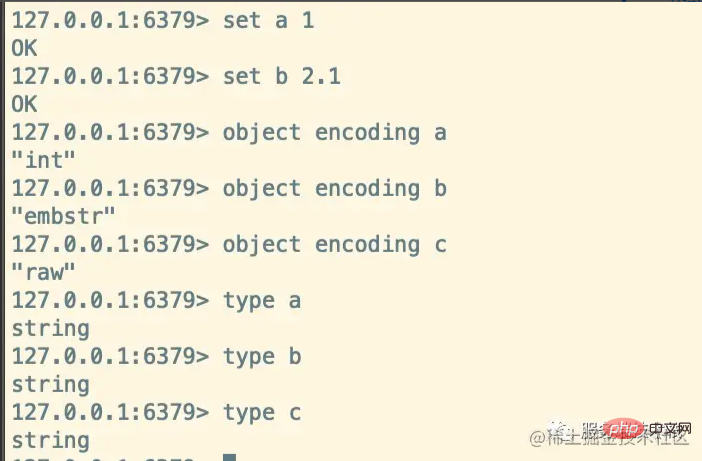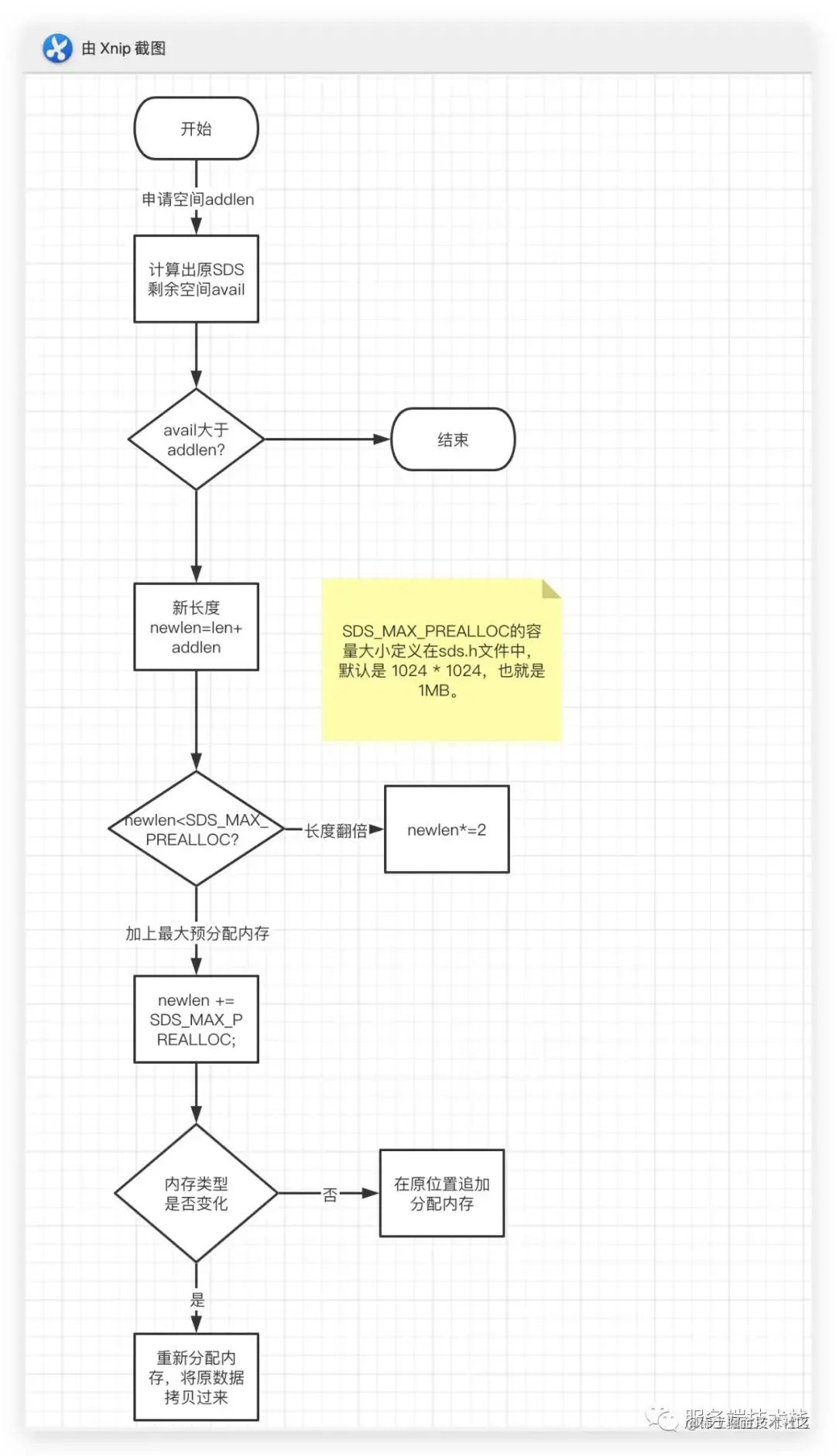Redis data type learning: Let's talk about String principles
This article will take you to understand the String in the Redis data type and talk about the storage principle of the String data type. I hope it will be helpful to you!

#Redis is a middleware that is frequently used in work. It supports rich data structures, has extremely strong read and write performance, and tps can reach 100,000.
Today’s article analyzes and summarizes the String type, which is also one of the most used data structures. This article is analyzed based on redis5.0. [Related recommendations: Redis video tutorial]
1. Basic usage
set key value [EX seconds] [PX milliseconds] [NX|XX]
1. set is the syntax, key is the specified name, and value is Values to be stored
2. EX specifies the expiration time in seconds, and PX specifies the expiration time in milliseconds
3. NX: The setting is successful only when the key does not exist
4, XX: The setting is successful only when the key exists
Summary: 5.0 supports the set command to specify the expiration time and the setting is successful only when it does not exist, that is, distributed lock addition can be achieved with one command For the lock function, setting the key and setting the expiration time in previous versions needed to be divided into two commands, making it more difficult to ensure atomicity.
2. Usage scenarios
1. Hotspot data cache, distributed session
2. Setnx Distributed lock
3, incr counter
4, Incr global id
5, Incr current limit
6, bit operation, bitmap Function, online user statistics 0/1 mark
3. Supported stored data types
Integer type, character type, float (single floating point type)
4. Different encoding types



## 5. String storage principle
In Redis, data is stored in a RedisObject classtypedef struct redisObject {
//这个类型可以是string,也可以是hash,zset等等
unsigned type:4;
unsigned encoding:4;
//记录lru,lfu淘汰算法依赖的访问时间和访问频率
unsigned lru:LRU_BITS;
/* LRU time (relative to global lru_clock) or * LFU data (least significant 8 bits frequency * and most significant 16 bits access time). */
//引用计数器
int refcount;
//指向真实数据结构对象
void *ptr;
} robj;len: represents the used length
Memory , when destroyed releases the memory once , easy to find
allocate memory twice , When destroyedRelease memory twice
embstr cannot be modified and is read-only.
7. When will int and embstr encoding be converted to raw
1. Int type data is no longer of int type and converted to raw 2. If the length is greater than 2^63-1, convert it to embstr3. If the embstr character exceeds 44 bytes, convert it to raw8. Advantages of SDS data structure
1,Binary safe can store image shaping, floating point type
- int
Stores 8-byte long integer long, 2^63-1 - Embstr
SDS simple Dynamic String in embstr format. The memory space is continuous , read-only, as long as the modification is executed, it will be converted into raw - Raw
, SDS, which stores strings larger than 44 bytes
Don’t worry about memory overflow, sds has automatic expansion capability
The time complexity of getting the string length is O(1), and the len attribute is stored
space pre-allocation and lazy space release
9. Why not use the character array in c?
1. Memory needs to be allocated in advance, which maymemory overflow
time complexity O(n)
memory reallocation
Binary data storage is not safe, pictures, videos, etc. cannot be saved.
十、关于内存预分配特性

通过源码分析,扩容策略是字符串在长度小于 SDS_MAX_PREALLOC 之前,扩容空间采用加倍策略,也就是保留 100% 的冗余空间。当长度超过 SDS_MAX_PREALLOC 之后,为了避免加倍后的冗余空间过大而导致浪费,每次扩容只会多分配 SDS_MAX_PREALLOC大小的冗余空间。
十一、关于惰性空间释放
惰性空间释放用于优化 SDS 的字符串缩短操作:当 SDS 的 API 需要缩短 SDS 保存的字符串时, 程序并不立即使用内存重分配来回收缩短后多出来的字节, 而是使用 free 属性将这些字节的数量记录起来,并等待将来使用。
//仅仅设置长度,没有真正清除数据
void sdsclear(sds s) {
//单纯设置长度为0
sdssetlen(s, 0);
//第一个字符设置为结束符
s[0] = '\0';
}真正的清除空间
sds sdsRemoveFreeSpace(sds s)
{
struct sdshdr *sh;
sh = (void*) (s-(sizeof(struct sdshdr)));
// 进行内存重分配,让 buf 的长度仅仅足够保存字符串内容
sh = zrealloc(sh, sizeof(struct sdshdr)+sh->len+1);
// 空余空间为 0
sh->free = 0;
return sh->buf;
}以上便是关于string的知识点记录,string的设计很多地方都非常巧妙,比如不同的结构体存储不同长度的字符串,不同编码类型存储不同长度的字符串,
空间预分配,空间惰性释放等,从存储结构,编码类型,内存分配策略和回收策略,作者都从性能方面做了非常多的考量设计,可想而知这也是redis为什么性能极高的原因,工作中也要学习这种追求极致性能的优良风格和设计风格。
更多编程相关知识,请访问:编程入门!!
The above is the detailed content of Redis data type learning: Let's talk about String principles. For more information, please follow other related articles on the PHP Chinese website!

Hot AI Tools

Undresser.AI Undress
AI-powered app for creating realistic nude photos

AI Clothes Remover
Online AI tool for removing clothes from photos.

Undress AI Tool
Undress images for free

Clothoff.io
AI clothes remover

AI Hentai Generator
Generate AI Hentai for free.

Hot Article

Hot Tools

Notepad++7.3.1
Easy-to-use and free code editor

SublimeText3 Chinese version
Chinese version, very easy to use

Zend Studio 13.0.1
Powerful PHP integrated development environment

Dreamweaver CS6
Visual web development tools

SublimeText3 Mac version
God-level code editing software (SublimeText3)

Hot Topics
 Solution to 0x80242008 error when installing Windows 11 10.0.22000.100
May 08, 2024 pm 03:50 PM
Solution to 0x80242008 error when installing Windows 11 10.0.22000.100
May 08, 2024 pm 03:50 PM
1. Start the [Start] menu, enter [cmd], right-click [Command Prompt], and select Run as [Administrator]. 2. Enter the following commands in sequence (copy and paste carefully): SCconfigwuauservstart=auto, press Enter SCconfigbitsstart=auto, press Enter SCconfigcryptsvcstart=auto, press Enter SCconfigtrustedinstallerstart=auto, press Enter SCconfigwuauservtype=share, press Enter netstopwuauserv , press enter netstopcryptS
 Golang API caching strategy and optimization
May 07, 2024 pm 02:12 PM
Golang API caching strategy and optimization
May 07, 2024 pm 02:12 PM
The caching strategy in GolangAPI can improve performance and reduce server load. Commonly used strategies are: LRU, LFU, FIFO and TTL. Optimization techniques include selecting appropriate cache storage, hierarchical caching, invalidation management, and monitoring and tuning. In the practical case, the LRU cache is used to optimize the API for obtaining user information from the database. The data can be quickly retrieved from the cache. Otherwise, the cache can be updated after obtaining it from the database.
 Caching mechanism and application practice in PHP development
May 09, 2024 pm 01:30 PM
Caching mechanism and application practice in PHP development
May 09, 2024 pm 01:30 PM
In PHP development, the caching mechanism improves performance by temporarily storing frequently accessed data in memory or disk, thereby reducing the number of database accesses. Cache types mainly include memory, file and database cache. Caching can be implemented in PHP using built-in functions or third-party libraries, such as cache_get() and Memcache. Common practical applications include caching database query results to optimize query performance and caching page output to speed up rendering. The caching mechanism effectively improves website response speed, enhances user experience and reduces server load.
 How to upgrade Win11 English 21996 to Simplified Chinese 22000_How to upgrade Win11 English 21996 to Simplified Chinese 22000
May 08, 2024 pm 05:10 PM
How to upgrade Win11 English 21996 to Simplified Chinese 22000_How to upgrade Win11 English 21996 to Simplified Chinese 22000
May 08, 2024 pm 05:10 PM
First you need to set the system language to Simplified Chinese display and restart. Of course, if you have changed the display language to Simplified Chinese before, you can just skip this step. Next, start operating the registry, regedit.exe, directly navigate to HKEY_LOCAL_MACHINESYSTEMCurrentControlSetControlNlsLanguage in the left navigation bar or the upper address bar, and then modify the InstallLanguage key value and Default key value to 0804 (if you want to change it to English en-us, you need First set the system display language to en-us, restart the system and then change everything to 0409) You must restart the system at this point.
 How to use Redis cache in PHP array pagination?
May 01, 2024 am 10:48 AM
How to use Redis cache in PHP array pagination?
May 01, 2024 am 10:48 AM
Using Redis cache can greatly optimize the performance of PHP array paging. This can be achieved through the following steps: Install the Redis client. Connect to the Redis server. Create cache data and store each page of data into a Redis hash with the key "page:{page_number}". Get data from cache and avoid expensive operations on large arrays.
 How to find the update file downloaded by Win11_Share the location of the update file downloaded by Win11
May 08, 2024 am 10:34 AM
How to find the update file downloaded by Win11_Share the location of the update file downloaded by Win11
May 08, 2024 am 10:34 AM
1. First, double-click the [This PC] icon on the desktop to open it. 2. Then double-click the left mouse button to enter [C drive]. System files will generally be automatically stored in C drive. 3. Then find the [windows] folder in the C drive and double-click to enter. 4. After entering the [windows] folder, find the [SoftwareDistribution] folder. 5. After entering, find the [download] folder, which contains all win11 download and update files. 6. If we want to delete these files, just delete them directly in this folder.
 PHP Redis caching applications and best practices
May 04, 2024 am 08:33 AM
PHP Redis caching applications and best practices
May 04, 2024 am 08:33 AM
Redis is a high-performance key-value cache. The PHPRedis extension provides an API to interact with the Redis server. Use the following steps to connect to Redis, store and retrieve data: Connect: Use the Redis classes to connect to the server. Storage: Use the set method to set key-value pairs. Retrieval: Use the get method to obtain the value of the key.
 How to optimize function performance for different PHP versions?
Apr 25, 2024 pm 03:03 PM
How to optimize function performance for different PHP versions?
Apr 25, 2024 pm 03:03 PM
Methods to optimize function performance for different PHP versions include: using analysis tools to identify function bottlenecks; enabling opcode caching or using an external caching system; adding type annotations to improve performance; and selecting appropriate string concatenation and sorting algorithms according to the PHP version.







